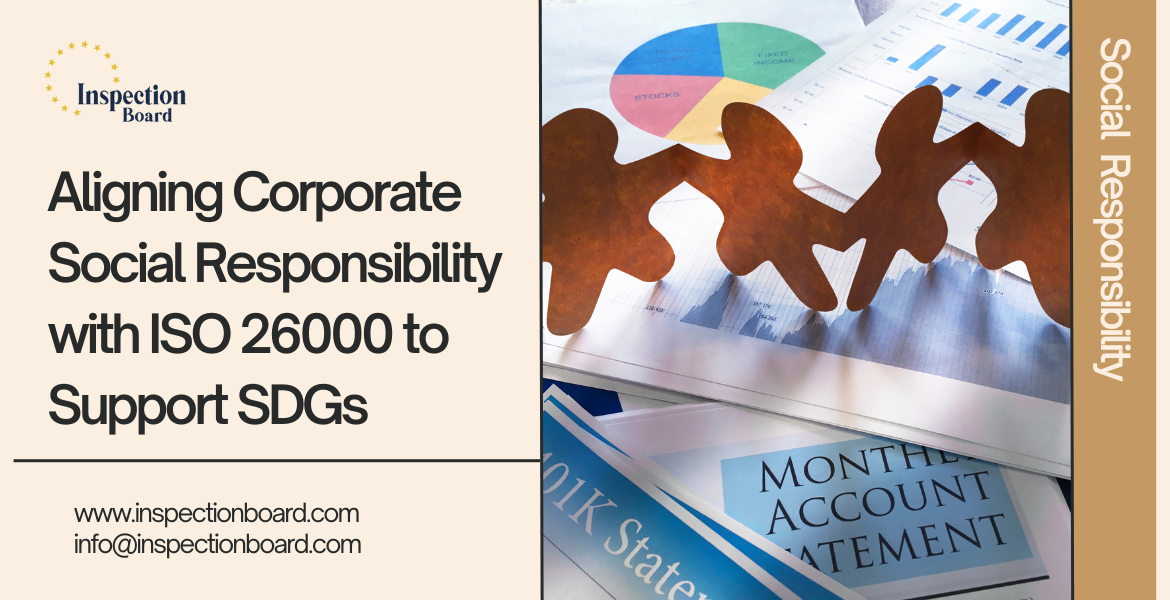- Call Us For Inquiry : +20 109 363 6115
- Mail Us Today : info@inspectionboard.com
Aligning Corporate Social Responsibility with ISO 26000 to Support Sustainable Development Goals
In recent years, the corporate world has seen a significant shift towards embracing sustainability and corporate social responsibility (CSR). Businesses are increasingly recognizing the importance of contributing to sustainable development while maintaining profitability. One of the critical frameworks that guide organizations in this endeavor is ISO 26000. This standard provides comprehensive guidance on social responsibility and is instrumental in helping companies align their CSR initiatives with the United Nations Sustainable Development Goals (SDGs). As we look towards 2024, the integration of ISO 26000 with the SDGs is more pertinent than ever.
Understanding ISO 26000
ISO 26000 is an international standard that provides guidelines for social responsibility. Unlike other ISO standards, ISO 26000 is not certifiable but serves as a guiding framework for organizations looking to operate in a socially responsible manner. It covers seven core subjects:
- Organizational Governance
- Human Rights
- Labor Practices
- The Environment
- Fair Operating Practices
- Consumer Issues
- Community Involvement and Development
These subjects are designed to help organizations understand and address their social, environmental, and economic impacts.
The Sustainable Development Goals
The Sustainable Development Goals, established by the United Nations in 2015, consist of 17 goals aimed at addressing global challenges, including poverty, inequality, climate change, environmental degradation, peace, and justice. The SDGs provide a universal framework for development that all countries and organizations are encouraged to achieve by 2030.
Integrating ISO 26000 with the SDGs
Aligning ISO 26000 with the SDGs can significantly enhance an organization's CSR strategy. Here’s how organizations can integrate these frameworks to support sustainable development effectively:
- Mapping Core Subjects to SDGs
Each of ISO 26000’s core subjects can be mapped to specific SDGs. For instance:
- Human Rights (ISO 26000) aligns with SDG 1: No Poverty and SDG 10: Reduced Inequality.
- Labor Practices align with SDG 8: Decent Work and Economic Growth.
- The Environment aligns with SDG 13: Climate Action and SDG 15: Life on Land.
2. Strategic Planning and Governance
Organizations should incorporate ISO 26000 guidelines into their strategic planning processes, ensuring that their governance structures support sustainable practices. This involves establishing policies, setting objectives, and developing action plans that reflect both ISO 26000 principles and SDG targets.
3. Stakeholder Engagement
Engaging with stakeholders is a critical component of ISO 26000. Organizations should communicate with stakeholders to understand their expectations and incorporate their feedback into CSR initiatives. This engagement helps build trust and ensures that CSR efforts are aligned with societal needs and SDG priorities.
4. Performance Measurement and Reporting
To demonstrate progress, organizations need to measure and report their performance against both ISO 26000 guidelines and SDG targets. Using standardized reporting frameworks such as the Global Reporting Initiative (GRI) can help in providing transparency and accountability.
5. Continuous Improvement
Social responsibility and sustainability are dynamic fields requiring continuous improvement. Organizations should regularly review and update their practices to address emerging challenges and opportunities related to ISO 26000 and the SDGs.
Inspection Board: Your Partner in ISO 26000 Training and Certification
At Inspection Board, we understand the importance of aligning your CSR efforts with international standards and global goals. Our comprehensive training and certification services are designed to help your organization seamlessly integrate ISO 26000 guidelines with the Sustainable Development Goals.
Why Choose Inspection Board?
- Expert Trainers: Our team of seasoned professionals brings extensive experience in CSR, sustainability, and ISO standards.
- Customized Programs: We offer tailored training programs that cater to the specific needs of your organization, ensuring practical and actionable insights.
- Certification Support: While ISO 26000 itself is not certifiable, we provide certification support for related standards and frameworks that enhance your CSR initiatives.
- Ongoing Support: We offer continuous support and resources to help you stay updated with the latest developments and best practices.
Case Study: A Practical Example
Consider a multinational corporation in the manufacturing sector. By adopting ISO 26000, the company can enhance its CSR initiatives across various dimensions:
- Environmental Stewardship: Implementing energy-efficient technologies and reducing waste aligns with ISO 26000’s environmental guidelines and supports SDG 12: Responsible Consumption and Production.
- Labor Practices: Ensuring fair wages and safe working conditions aligns with ISO 26000’s labor practices and supports SDG 8: Decent Work and Economic Growth.
- Community Development: Investing in local communities through education and health programs aligns with ISO 26000’s community involvement guidelines and supports SDG 4: Quality Education and SDG 3: Good Health and Well-being.
By integrating these practices, the company not only complies with international standards but also contributes meaningfully to global sustainable development.
Inspection Board
Your Partner in Sustainable Development and Corporate Social Responsibility

